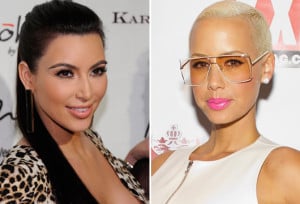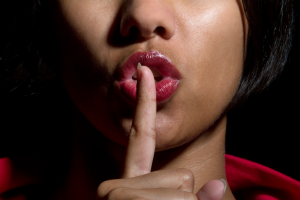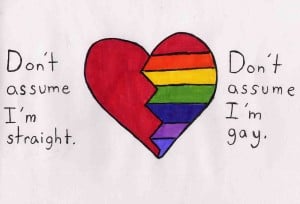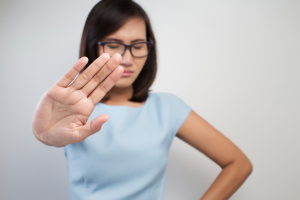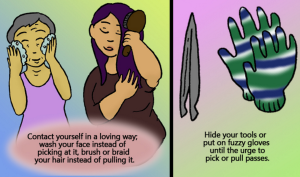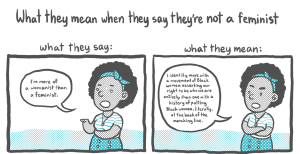You may have heard about the Twitter beef between reality TV star Khloe Kardashian and model Amber Rose. I don’t say this presuming you give a damn. (I can already hear it: “Who cares?”)
But I know that if you, like me, spend time on the Internet, then you, like me, often come across “news” about the Kardashians, whether you like it or not.
That’s why this particular dust-up is an opportunity to examine what happens when two women try to tear each other down for the world to see.
If you spend your time thinking about how forces like the patriarchy, racism, and classism influence your life, you may see no reason to pay attention to this.
But if you want to know about how our role as consumers allow those very same forces shape our media, and therefore impact our society, then you might want to take a closer look.
So let me break down what’s happening.
We’ve got Amber Rose, who used to date rapper Kanye West, who’s now married to Kim Kardashian, who’s the big sister of Khloe Kardashian.
And Khloe Kardashian is big sister to Kylie Jenner, who’s rumored to be dating rapper Tyga, who used to date model Blanc Chyna, who’s BFFs with Amber Rose.
Got that? It’s okay if you don’t. All you need to know is that, when it comes to the entertainment value of two celebrities going at each other, conflict between Amber Rose and Kim Kardashian is tabloid gold.
So here are the juicy details. In an interview with The Breakfast Club radio, Amber Rose said that 17-year-old Kyle Jenner is too young for her 26-year-old rumored boo, Tyga, and “he should be ashamed of himself.”
The rest of the story is pretty predictable. If you’ll allow me to paraphrase for the sake of summary, it all went something like this:
Khloe Kardashian tweets: “Amber Rose is a whore.”
Amber Rose tweets: “Kim Kardashian is a whore.”
Kanye West says: “Amber Rose is the whoriest of whores.”
It’s one big hot mess of sex-shaming.
Here’s how the issues impacting our everyday lives play out in this drama, too.
The Catch-22 for the Kardashians, Rose, and Women Generally Speaking
You may have witnessed or been part of the made-for-your-life version of this script, only without the television cameras and fame. It’s a classic example of how sex-shaming works.
Sex-shaming – more commonly known as slut-shaming – is based on the premise that people, particularly women, who are deemed “too sexually active” are less valuable than those who are not. Khloe Kardashian didn’t refute Amber Rose’s words.
Instead, she set out to discredit her by pointing out that Rose began stripping at the age of 15. And Rose responded in kind, pointing out that Khloe Kardashian’s fame is built on sister Kim’s beginnings as a sex tape star.
Essentially, we – as the judging public – have been presented with the evidence, and it’s up to us to decide who’s the bigger slut, and therefore the loser in this fight.
Which is interesting, because without these personal histories, we wouldn’t know who either of these women are.
Both of their fame grows from the sexualization of women’s bodies. At just 15, Amber Rose was not in control of this – but now, she’s made a career out of being a bombshell.
And the Kardashian fame that many of us expected to last for the 15 minutes after Kim’s sex tape release has turned into years of abundance for the whole Kardashian family.
The conundrum is this: The media values these women because of their sexuality, and yet, if they’re deemed too sexual, then they’re shamed for that.
Sound familiar? This catch-22 in the delicate balance of being too sexual or not sexual enough shows up in nearly every woman’s life from a young age.
How Young Is Too Young for Sex-Shaming?
Let’s be clear: A 15-year-old exotic dancer is being exploited – by the fact of her underage status (and everything that this means around giving consent).
I don’t know Amber Rose, so I can’t claim to know the details of her life, but I know that she’s biracial and grew up in a low-income household.
For many young girls, exploitation resides at the intersections of sexism, racism, and economic injustice. Coercion, poverty, and violence all contribute to conditions such as sex trafficking and child commercial exploitation.
While Khloe Kardashian put the focus on Amber Rose as a 15-year-old stripper, the reality is a much bigger picture.
The fact that Kardashian could use that as fodder for arguing with Rose – and for our entertainment – reveals that many of us are still unaware of that.
We’re meant to judge a young Amber Rose for being too shameless to cover up her body, not the men who objectified her young body – or the society that allowed them to do so.
Kanye West’s reaction to the relationship between Tyga and teenager Kylie Jenner says it all. “I think he got in early,” he said with a chuckle. “I think he was smart.”
He, along with many others, consider it “smart” to get with a girl before she’s even a woman, when she’s most vulnerable to the exploitative pressures that limit her choices as she, like the rest of us, struggle to fit that illusive box of social norms that influence our sexuality.
Like sex-shaming, this isn’t unique to celebrities, but part of our culture.
What All of This Means for Us and the Media
At the end of the day, in spite of all of the complex social issues at play, the media’s coverage of this drama is meant for our entertainment, so we could just leave it at that.
After all, we don’t exactly pay attention to the Kardashians for the sake of deep political analysis, so it’s easy to dismiss as insignificant.
What would that leave us with? The media presents this as a trivial cat fight. Entertainment news is in the business of making money, and apparently sex-shaming makes money.
What does that say about us?
Our consumption of this kind of media – and even our apathy about it – sends the message that there’s value in perpetuating the social conditions leading to the sexual exploitation and shaming of women and girls, even though those conditions can have some very real, very dangerous consequences.
As more critical and compassionate consumers, we have the power to shift that lens by valuing media that honors women and girls and respects our agency instead.
Does that mean we can’t indulge in recreational media that has nothing more than entertainment value? No. I know I’m not giving up my guilty pleasures.
But what we can do is recognize when something popular upholds harmful ideas about what it means to be a woman, and use our consumer power to make a different type of media popular instead – one that’s aligned with our progressive values of treating every person with respect.
Show that this isn’t about choosing #TeamAmberRose or #TeamKardashian as most respectable, and we’re not going to participate in the sex-shaming.
We’re on #TeamGenderJustice, and if anyone deserves our critique, it’s the media.
[do_widget id=’text-101′]
Maisha Z. Johnson is the Digital Content Associate and Staff Writer of Everyday Feminism. You can find her writing at the intersections and shamelessly indulging in her obsession with pop culture around the web. Maisha’s past work includes Community United Against Violence (CUAV), the nation’s oldest LGBTQ anti-violence organization, and Fired Up!, a program of California Coalition for Women Prisoners. Through her own project, Inkblot Arts, Maisha taps into the creative arts and digital media to amplify the voices of those often silenced. Like her on Facebook or follow her on Twitter @mzjwords.
Search our 3000+ articles!
Read our articles about:
Our online racial justice training
Used by hundreds of universities, non-profits, and businesses.
Click to learn more


